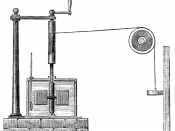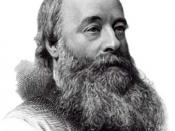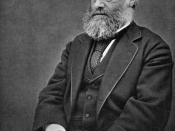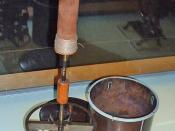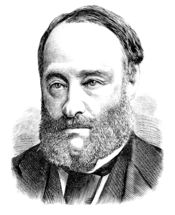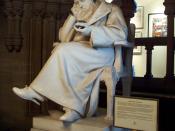James Joule was born on December 24th, 1818. He was born in Salford, Lanshire, England. Joule was born into a wealthy family who owned a very good brewery business. He was the second of four brothers. As a child he spent most of his time inside because he was weak, shy, and had a spinal disorder. While he stayed inside he studied a lot. Joule was educated at home until he was fifteen years old. After that he went to work for his family, but still studied part-time with his older brother. Joule and his brother paid private tutors to teach them. One of the tutors was the famous scientist John Dalton. Dalton taught them chemistry, physics, the scientific method, and mathematics. Dalton sparked Joule?s interest in science. Joule wanted to attend a University to study science, but since his father became ill he had to stay home and help his brothers run the brewery.
That didn?t stop Joule from his interests in science. He set up a laboratory in his house and experimented daily after work. In 1847 Joule married Amelia Grimes. They had three children together. Joule was so dedicated to his work that he even experimented on their honeymoon. James Joule died on October 11, 1889 in Sale, Cheshire, England.
Joule lived during the Age of Romanticism and the Industrial Revolution. During the Industrial Revolution many new things were invented. Joule took part in this. He built parts that helped in inventing the refrigerator later on. The industrial revolution brought money and the world wasn?t in a depression so people had money. This money helped with his studies. It bought him an education and paid for his laboratory. In general people back then were more religious than today. Joule believed that God was responsible for his work. Many other scientists were also very religious like Joule was.
Joule had three big contributions. He proved that energy could neither be created nor destroyed. He found the mechanical equivalence of heat. He also discovered a law that was named after him, Joule?s Law.
He proved that energy couldn?t be created or destroyed. He built small electromagnets to show electrical energy generated by mechanical energy in a dynamo can produce heat. This proves his point because heat is a form of energy. Next he built small, revolving electromagnets that turned quickly between poles of another electromagnet that was in a big wooden box. He put the electromagnets in a glass tube full of water. He measured the water temperature before and after. He found the electric current made the water warmer.
His second great accomplishment was finding the mechanical equivalence of heat. Joule wasn?t famous for finding it, but for the way he found it. He had a paddle stir water in a copper tube. The wheel was turned by falling weights. When the weights fell they made energy. The farther the weights fell the hotter the water got, meaning the more energy produced. This experiment showed the weights had kinetic energy showed as heat energy in water. Joule found the quantity of heat produced by friction of bodies of solids and liquids is always proportional to the amount of heat expanded. He found you need mechanical energy to heat a pound of water 1 degree. He also found heat is a form of energy and found it?s rate of exchange.
Joule?s last great accomplishment was finding power dissipated by resistor is E=(I*I)RT. This is known as Joule?s Law. Another common equation of this is W=FD. This equation means work is force multiplied by distance. Joule was the first person to calculate the speed of a molecule of gas. To fond Joule?s Law he found heat produced in a wire by an electrical current is proportional to the resistance of the wire multiplied by the square of the current.
Along with Joule?s big accomplishments he also did other things. He found the cooling affect when a gas rapidly expands. This was later used in the refrigerator. The unit of energy Joule was named after him. It is a British thermal unit for work. One Joule is work done when a force of one Newton moves something one meter. Lie many other scientists he had a few inventions and partial inventions. Two of these include the ?arc? which is used in electrical welding and the displacement pump. Joule worked with Lord Kelvin on more accurate, reliable thermometers. He helped in discovering the Law of Conservation of Energy. He also worked with Kelvin on what became the Joule-Kelvin cooling effect. Joule had many accomplishments that help us in science and everyday life
